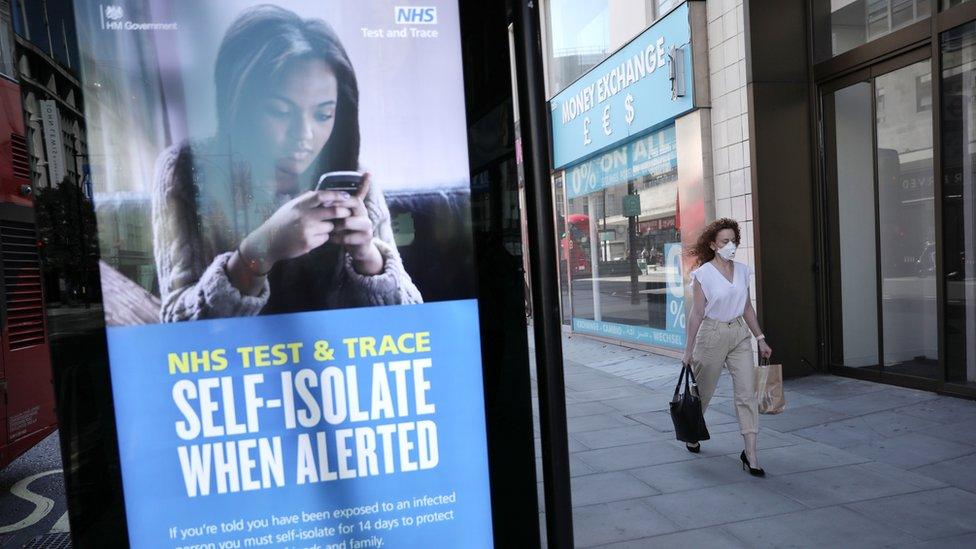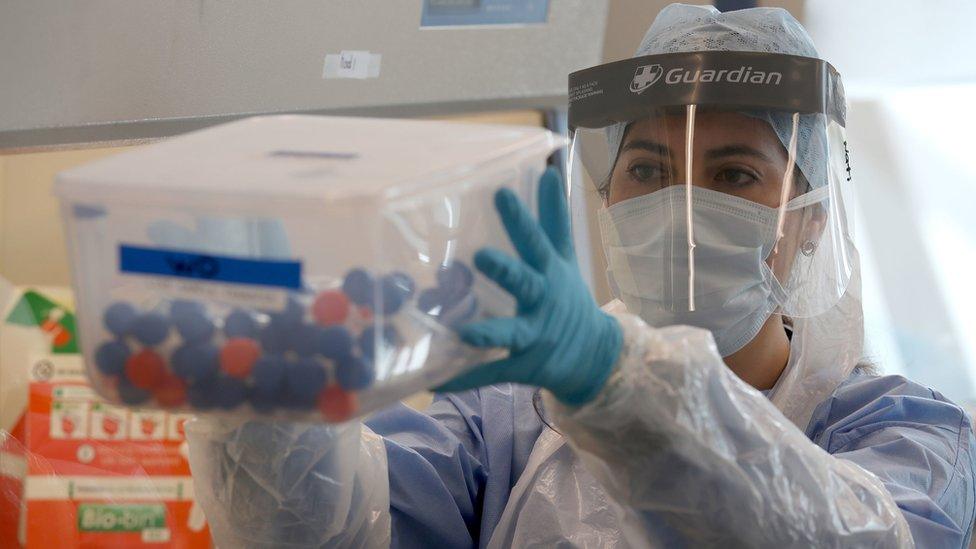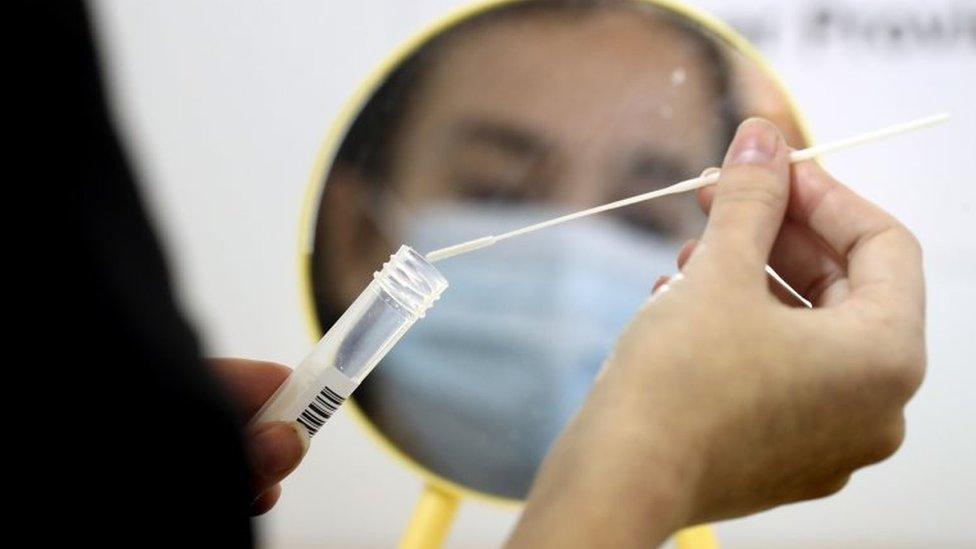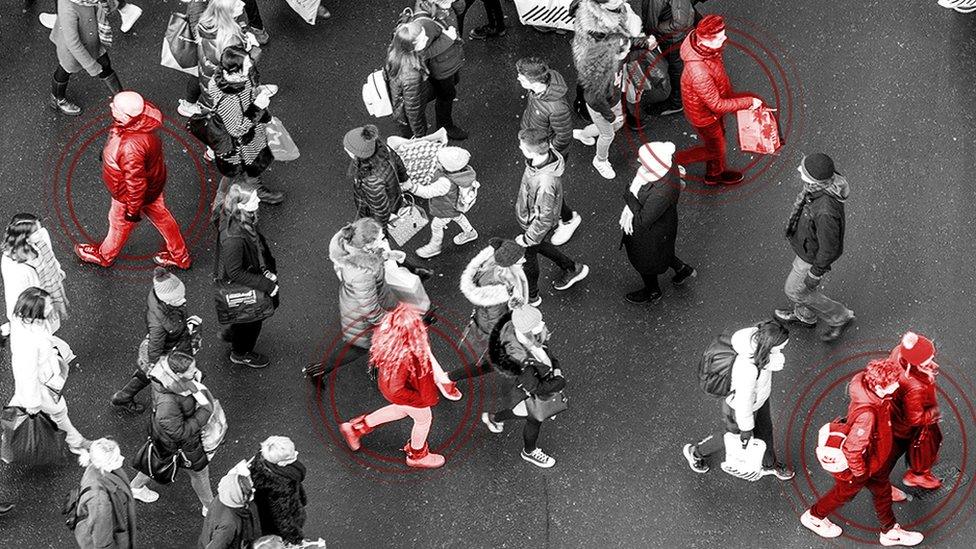Covid-19: Few people with symptoms are self-isolating, study finds
- Published
- comments

Fewer than one in five people request a Covid-19 test if they have symptoms, while the number who follow full self-isolation rules is low, a large study of the test-and-trace system has found.
The report, published in the British Medical Journal, external, also found only half of people knew the main Covid symptoms.
These include a cough, high temperature and loss of taste or smell.
Experts said the findings suggested the impact of the £37bn NHS Test and Trace system was "limited".
The Department for Health and Social Care said test-and-trace had saved "countless lives", adding that the latest ONS data found the "overwhelming majority" self-isolated when asked to.
The findings are based on 74,697 responses to online surveys from 53,880 people aged 16 or older living in the UK.
In total, 37 survey waves were carried out from 2 March last year to 27 January this year, with about 2,000 participants in each wave.
Experts involved in the study, including from Public Health England's behavioural science team, found that just 18% of those with coronavirus symptoms said they had requested a test, while 43% with symptoms in the previous seven days adhered to full self-isolation.
Men, younger people and those with young children were less likely to self-isolate, as were those from more working-class backgrounds, people experiencing greater financial hardship, and those working in key sectors.
Common reasons for not fully self-isolating included needing to go to the shops or work, for a medical need other than Covid-19, to care for a vulnerable person, to exercise or meet others, or because symptoms were only mild or got better.

What is test-and-trace?
Test-and-trace, or contact tracing, is a system for identifying people who have been in close contact with someone who has caught Covid.
Those people are then asked to self-isolate for 10 days - even if they have no symptoms - to prevent the chance of passing the virus on, if they do have it.
Each UK nation has its own contact tracing service:
England - NHS Test and Trace, external
Scotland - Test and Protect, external
Wales - Test, Trace, Protect, external
Northern Ireland - Contact tracing service, external

The report's authors, who also included experts from King's College London, said: "With such low rates for symptom recognition, testing, and full self-isolation, the effectiveness of the current form of the UK's test, trace, and isolate system is limited."
However, the team did acknowledge that while adherence to test, trace and isolate rules had been low, "some improvement has occurred over time".
Across all waves, 43% of people adhered to rules around self-isolation, though this improved in January to 52%.
According to the latest Office for National Statistics data, 90% of people told they must self-isolate by NHS Test and Trace after being in contact with a positive Covid case did so.
The authors said greater practical and financial support was likely to improve adherence to the rules, adding that targeted messaging and policies for men, younger age groups and key workers might also be necessary.

Last month, the Commons Public Accounts Committee said the impact of NHS Test and Trace was still unclear, despite the government setting aside £37bn for it over two years.
MPs said the spending was "unimaginable" and warned the taxpayer could not be treated like an "ATM machine".
And in December, the National Audit Office also criticised the scheme, external, saying it had not yet achieved its objectives.
Paulette Hamilton, vice chairwoman of the Local Government Association's community wellbeing board, said the findings of the latest study were "concerning".
She said: "Although the rollout of the vaccine is providing us with hope of a return to our normal way of life, the responsibility on us all to get ourselves tested when necessary and share our contacts on request will be needed for some time to come, in order to keep case rates as low as possible.
"It is also critical that everyone does the right thing and self-isolates when required. Key to this is making sure people understand what self-isolation means, feel able to comply and are supported to do so if necessary."

LOOK-UP TOOL: How many cases in your area?
LOCKDOWN RULES: What are they and when will they end?
SOCIAL DISTANCING: How can I meet my friend safely?
FACE MASKS: When do I need to wear one?
VACCINE: When will I get the jab?

Meanwhile, the head of the NHS has urged anyone who is eligible for a Covid-19 vaccine to book one immediately - and for people to turn up for second doses when called.
NHS chief executive Sir Simon Stevens said: "We're well on track to meet our 15 April goal of offering NHS Covid vaccination to everyone aged 50 and over, as well as other high risk groups.
"In just the past two weeks, we've now jabbed nearly 85% of people aged 50-54, and over three million of the highest risk people have also now had their top-up second dose."
The call comes as Wednesday's daily coronavirus figures, external showed continued falls in deaths, hospital admissions and infections.
There were 43 deaths within 28 days of a positive coronavirus test, 268 patients admitted into hospital and 4,052 new cases recorded, with the seven-day averages down by 39.9%, 22.6% and 11.5% respectively.
A Department for Health and Social Care spokesman said: "Since last May, NHS Test and Trace has contacted 3.2 million people who tested positive, and another 6.4 million of their contacts.
"Behind these numbers are countless lives saved and the latest ONS figures show that when people are asked to self-isolate, the overwhelming majority do so.
"It is vital that people continue to do their bit by isolating when they are asked to.
"As the prevalence of coronavirus falls, our testing and tracing system becomes more important in identifying and suppressing local outbreaks while also responding rapidly to the threat of new variants."

SLEEP AND COVID: How do stressful situations affect our dreams?
GRENFELL ATHLETIC: Healing the community after tragedy

- Published10 March 2021

- Published3 May 2022

- Published20 November 2020

- Published5 August 2021
